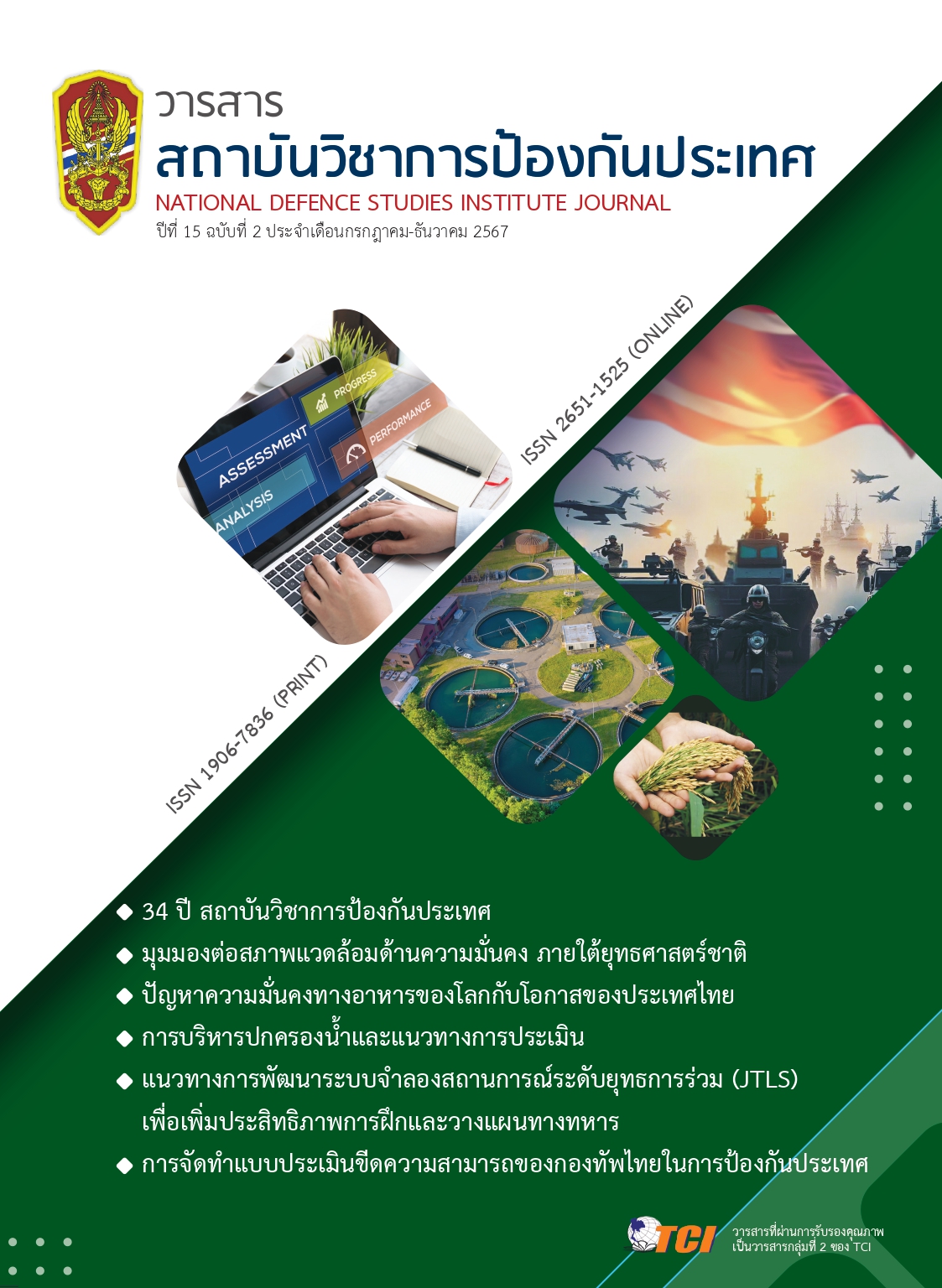Non-Cognitive Skills and Academic Efficiency: Preliminary Study at Chulachomklao Royal Military Academy
Main Article Content
Abstract
This research aims to study effort-indicative non-cognitive skills that affect the academic efficiency of the cadets of Chulachomklao Royal Military Academy, using a quantitative economic research methodology and psychological variations. The research consists of 932 sampling groups and the primary data is the variation of non-cognitive skills, collected from questionnaires, voluntarily answered, through the e-learning system. The secondary data consists of study outcomes, obtained from the Division of Statistics and Personal Records. This research analyzes the data through the use of descriptive statistics and regression equation.
Though the primary data might have been biased, the research found the following. 1) The effort-indicative non-cognitive skills affected the cadets’ academic efficiency and the level of motivation influenced the effort to the point that it affected their Grade Point Average in each semester with significant implications, dependent mainly on the cadets’ personality traits. 2) The cadets’ consciousness was influential on their Grade Point Average in the first semester and also in each semester in the first, second and fifth year of study. 3) The cadets’ agreeable disposition was influential on their Grade Point Average in each semester in the second and fourth year of study. 4) The cadets’ sensitive temperament was influential on their Grade Point Average in each semester in the fourth and the fifth year of study; and 5) the cadets’ setting of life’s directions was influential on their Grade Point Average in each semester in the fourth year of study.
This research suggests that the Royal Thai Army should consider adding effort-indicative non-cognitive skills to their criteria in selecting applicants to the Pre-Cadet School and Chulachomklao Royal Military Academy should create a database of cadets for the benefit of research and development.
Article Details

This work is licensed under a Creative Commons Attribution-NonCommercial-NoDerivatives 4.0 International License.
The articles, images, tables, graphs, written content, and opinions published in this journal are solely those of the authors and do not necessarily reflect the views or positions of the National Defence Studies Institute or its academic affiliates.
References
กฤติกา หล่อวัฒนวงศ์. (2547). การศึกษาเปรียบเทียบบุคลิกภาพตามแนวคิดห้าองค์ประกอบ เชาวน์อารมณ์ตามแนวคิด โกลแมน และความพึงพอใจในลักษณะงาน ของผู้ปฏิบัติงานฝ่ายขายของโรงแรมในกรุงเทพมหานคร (วิทยานิพนธ์ปริญญามหาบัณฑิต). มหาวิทยาลัยธรรมศาสตร์. กรุงเทพฯ.
ชรินทร์ยา ป้อมใย. (2554). บุคลิกภาพห้าองค์ประกอบ การเสริมสร้างพลังอำนาจในงานเชิงจิตวิทยา และความผูกพันในงาน: กรณีศึกษาวิศวกรในบริษัทเอกชนแห่งหนึ่งในเขตกรุงเทพมหานคร (วิทยานิพนธ์ปริญญามหาบัณฑิต). มหาวิทยาลัยธรรมศาสตร์. กรุงเทพฯ.
ชัชวาล เทียมถนอม. (2550). ความสัมพันธ์ระหว่างความแตกต่างระหว่างเพศ ความเชื่ออำนาจในการควบคุม และการ ประเมินสภาวะแวดล้อมของนักศึกษามหาวิทยาลัยธรรมศาสตร์ ศูนย์รังสิต (โครงการวิจัยเสริมหลักสูตร). มหาวิทยาลัยธรรมศาสตร์. กรุงเทพฯ.
ทัศนา โฉมที. (2518). การเปลี่ยนแปลงทัศนคติอันเป็นผลของสารสื่อที่ทำให้เกิดความกลัวและความเชื่ออำนาจในตน (วิทยานิพนธ์ปริญญามหาบัณฑิต). มหาวิทยาลัยศรีนครินทรวิโรฒ. กรุงเทพฯ.
ทัศนีย์ หอมกลิ่น. (2551). ความสัมพันธ์ระหว่างบุคลิกภาพแบบเชื่อในปัจจัยควบคุม ความสามารถในการเผชิญและฟันฝ่าอุปสรรคและพฤติกรรมการเผชิญความเครียด โดยมีการรับรู้ความสามารถของตนเองเป็นตัวแปรกำกับความ สัมพันธ์ระหว่างความสามารถในการเผชิญและฟันฝ่าอุปสรรคกับพฤติกรรมการเผชิญความเครียด: กรณีศึกษา การไฟฟ้านครหลวงเขตมีนบุรีและเขตลาดกระบัง (วิทยานิพนธ์ปริญญามหาบัณฑิต). มหาวิทยาลัยธรรมศาสตร์. กรุงเทพฯ.
ทินกร วงศ์ปการันย์, และณหทัย วงศ์ปการันย์. (2554). การวิเคราะห์องค์ประกอบเชิงยืนยันของแบบวัดความภาคภูมิใจในตนเองของโรเซนเบิร์ก: การศึกษาในนักศึกษาไทย, วารสารสมาคมจิตแพทย์แห่งประเทศไทย, 56(1), 59-70.
ทิพย์วิมล จรลี. (2558). บุคลิกภาพห้าองค์ประกอบ ความสามารถในการเผชิญและฟันฝ่าอุปสรรคและการรับรู้พฤติกรรมการเป็นสมาชิกที่ดีขององค์การ ของพนักงานกลุ่มบริษัทผลิตไฟฟ้าขนาดเล็กแห่งหนึ่ง (วิทยานิพนธ์ปริญญามหาบัณฑิต). มหาวิทยาลัยธรรมศาสตร์. กรุงเทพฯ.
นนท์ธยา ทองอ่อน. (2557). รูปแบบการดำเนินชีวิต ที่ส่งผลต่อประสิทธิภาพการปฏิบัติงานของพนักงานให้บริการข้อมูลลูกค้าทางโทรศัพท์ของบริษัทโทรคมนาคมแห่งหนึ่ง (วิทยานิพนธ์ปริญญามหาบัณฑิต). มหาวิทยาลัยเกษตรศาสตร์. กรุงเทพฯ.
นันทิมา นาคาพงศ์. (2559). การสร้างและพัฒนาแบบวัดบุคลิกภาพห้าองค์ประกอบหลัก สำหรับนักเรียนชั้นประถมศึกษา และมัธยมศึกษา (รายงานการวิจัยฉบับสมบูรณ์). สถาบันทดสอบทางการศึกษาแห่งชาติ (องค์การมหาชน).
นิภาพร พวงมี. (2554). บุคลิกภาพห้าองค์ประกอบกับการรับรู้วัฒนธรรมองค์การของพยาบาล โรงพยาบาลมหาวิทยาลัยแห่งหนึ่ง (วิทยานิพนธ์ปริญญามหาบัณฑิต). มหาวิทยาลัยธรรมศาสตร์. กรุงเทพฯ.
พรทิพย์ วิศาลสุวรรณกร. (2546). ความสัมพันธ์ระหว่างบุคลิกภาพ การรับรู้ความสามารถของตนเอง ปัจจัยส่วนบุคคล และ ความผูกใจมั่นต่อการเปลี่ยนแปลง (วิทยานิพนธ์ปริญญามหาบัณฑิต). จุฬาลงกรณ์มหาวิทยาลัย. กรุงเทพฯ.
รัชดา ไชยโยธา. (2543). ความสัมพันธ์ระหว่างความเชื่อในปัจจัยควบคุมภายในและภายนอก กับพฤติกรรมการเผชิญปัญหาของผู้ถูกคุมความประพฤติในกรุงเทพมหานคร (วิทยานิพนธ์ปริญญามหาบัณฑิต). มหาวิทยาลัยธรรมศาสตร์. กรุงเทพฯ.
สุวิมล จอดพิมาย. (2537). ความสัมพันธ์ระหว่างความเชื่ออำนาจภายใน-ภายนอกตน อัตมโนทัศน์ และผลสัมฤทธิ์ทางการเรียนของนักศึกษาพยาบาล วิทยาลัยพยาบาลเซนต์หลุยส์ (วิทยานิพนธ์ปริญญามหาบัณฑิต). มหาวิทยาลัยเชียงใหม่.
อารีย์วรรณ สุทธิพงศ์พันธ์. (2563). การวางแผนทางการเงินส่วนบุคคล: กรณีศึกษานักเรียนนายร้อย โรงเรียนนายร้อยพระจุลจอมเกล้า (รายงานการวิจัย). ส่วนการศึกษา โรงเรียนนายร้อยพระจุลจอมเกล้า.
อัจฉรา พุ่มดวง. (2527). การศึกษาความสัมพันธ์ระหว่างความเชื่อภายใน-ภายนอกตน กับพฤติกรรมการเผชิญภาวะเครียด ในผู้ป่วยมะเร็งที่ได้รับรังสีรักษา (วิทยานิพนธ์ปริญญามหาบัณฑิต). มหาวิทยาลัยมหิดล. กรุงเทพฯ.
Andrisani, P. J. (1977). Internal-External Attitudes, Personal Initiative, and the Labor Market Experience of White and Black Men. The Journal of Human Resources, 12(3), 308-328.
Atkinson, J. W. (1964). An Introduction to Motivation. Princeton, NJ: Van Nostrand.
Bandura, A. (1997). Self-Efficacy: The Exercise of Control. New York: W.H. Freeman and Company.
Borg, M. O., Mason, P. M., & Shapiro, S. L. (1989). The Case of Effort Variables in Student Performance. The Journal of Economic Education, 20(3), 308-313.
Goldsmith, A. H., Veum, J. R., & Darity, W. A. (1997). The Impact of Psychological and Human Capital on Wages. Economic Inquiry, 35(4), 815-829.
Jacob, B. A. (2002). Where the Boys Aren’t: Non-Cognitive Skills, Returns to School and the Gender Gap in Higher Education. Economics of Education Review, 21(6), 589-598.
Mueller, G., & Plug, E. J. S. (2006). Estimating the Effect of Personality on Male and Female Earnings. Industrial and Labor Relations Review, 60(1), 3-22.
Rattana-ananta, P. (2014). Effects of Self-Efficacy on Individual Earnings: A Preliminary Study of the Thai Labor Market. Journal of Population and Social Studies, 22(2), 174-191.
Rosenberg, M. (1965). Society and the Adolescent Self-Image. Princeton, NJ: Princeton University Press.
Rotter, J. B. (1966). Generalized Expectancies for Internal versus External Control of Reinforcement. Psychological Monographs, 80(1), 1-28.
Schwarzer, R., & Jerusalem, M. (1995). The General Self-Efficacy Scale (GSE). Retrieved August 29, 2024 from https://userpage.fu-berlin.de/health/engscal.htm


